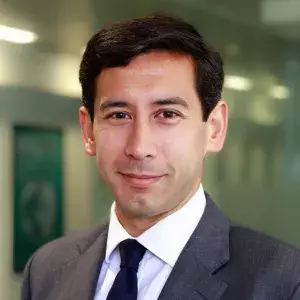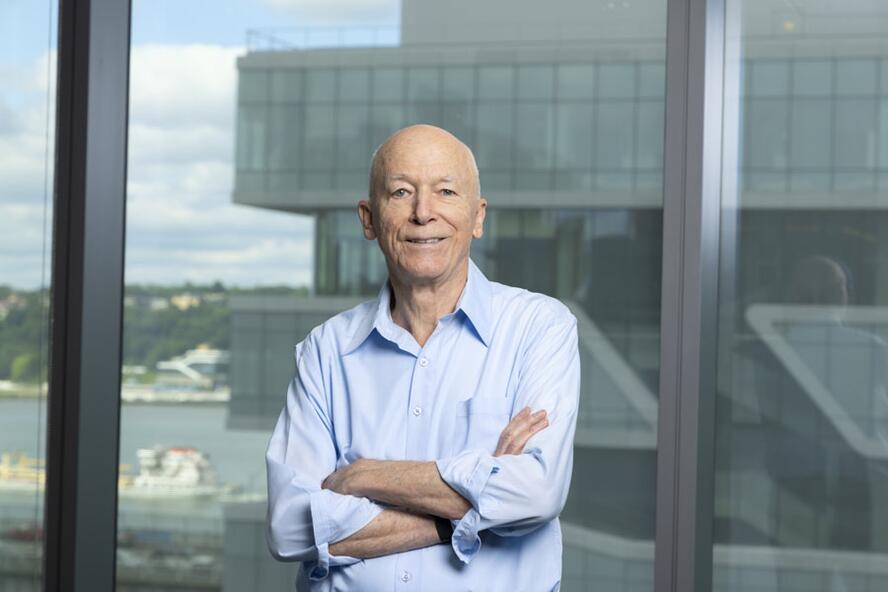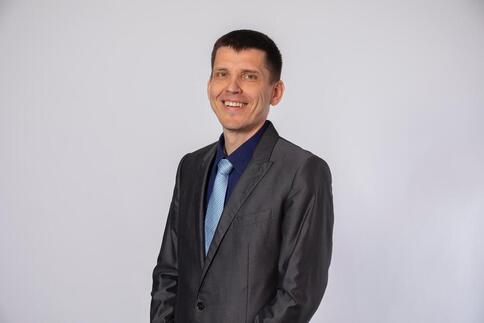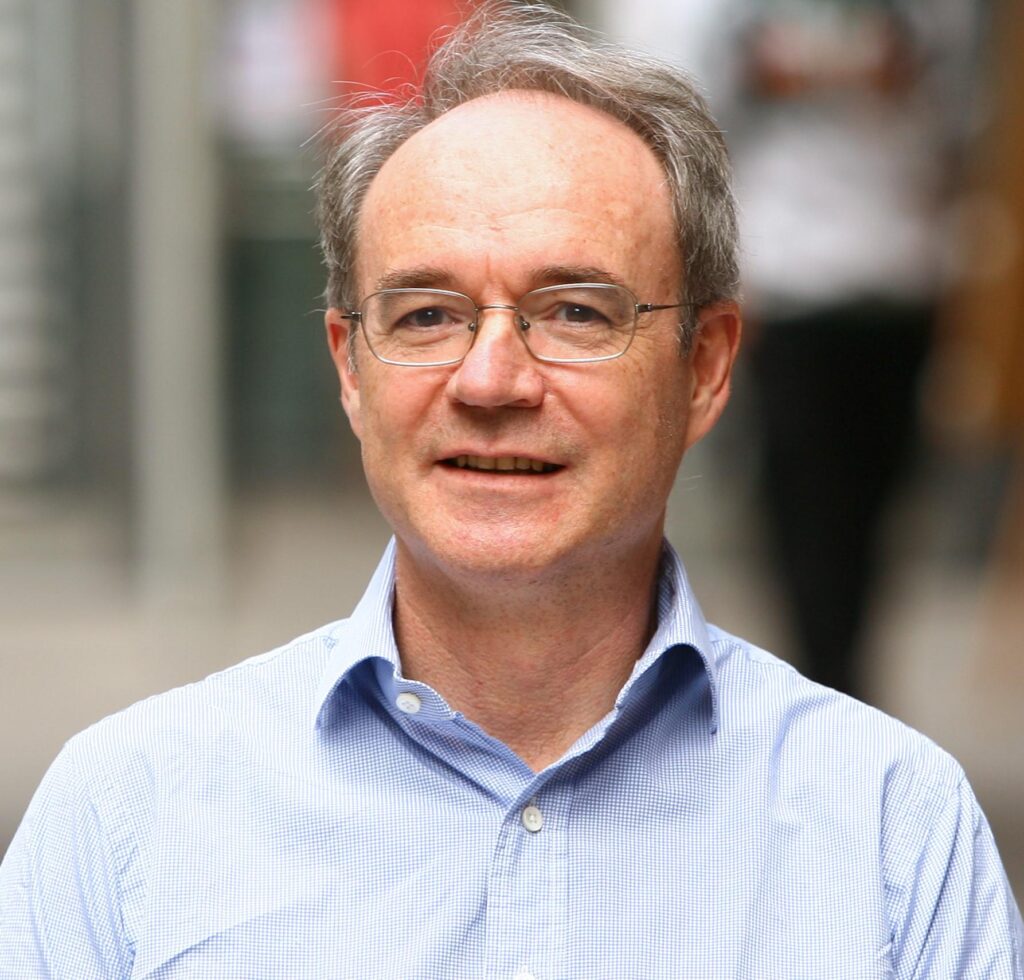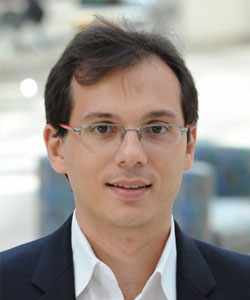Financial Economics of Climate and Sustainability
Finance will be instrumental in facilitating the transition to lower-carbon economies. This collaborative global doctoral reading group prepares faculty, post-docs, and doctoral students to train the next generation of finance professionals.

Why this collaborative global doctoral reading group?
Climate change is one of the most critical issues facing the planet and will require massive flows of capital. Finance will be instrumental in facilitating the transition to lower-carbon economies. Business schools need to be able to train the next generation of finance professionals. To do this, we will need far more professors trained to teach climate finance. Financial Economics of Climate and Sustainability (FECS) seeks to be an important, timely, and catalytic development in the climate finance space designed to support the development of the next generation of scholars and educators and to create a community of researchers in this field.
A global reading group, delivered locally
FECS has both global and local elements. The twelve, two-hour synchronous Core Sessions, taught by scholars at nine universities, are available to students globally, but the experience is customized locally at each participating school by a local faculty convener. Schools determine locally whether and how to offer the reading group. At some schools, a version of FECS is offered for credit, and local instructors may hold additional sessions and set course requirements (typically a paper). At schools where a course is not available for credit, local conveners may permit students to audit the course, offer enrichment sessions, or supervise independent research projects. Contact your local faculty coordinator for details.
To join us in FECS
FECS is available to scholars across the world. There are three simple steps to join. First, a faculty member agrees to be the local faculty coordinator. (Applications for additional schools and financial regulators have closed for 2025.). Second, local faculty coordinators collect the names and email details of participants and submit them to FECS. Third, before our first class on 4 Feb 2025, FECS will send the participants information on joining, including details on the course Dropbox, Zoom links, and Slack channel.
Dates and Content
FECS will be taught from February 4 to April 29, 2025 on Tuesdays from 11:00-13:00 EST/EDT. Note that because of differing national practices of adoption of daylight savings times (e.g., US-Mar 9; UK/Euro-Mar 30), check below for weeks where your session may be at a locally different time.
- Feb 4 – Introduction to climate science
- Feb 11 – Climate, Sustainability, Economic and Finance Theory 1
- Feb 18 – Climate, Sustainability, Economic and Finance Theory 2
- Feb 25 – Climate, Accounting, and Corporate Carbon Disclosures
- March 4 – Climate and Asset Pricing (Theory)
- March 11* – Climate and Asset Pricing (Empirics) (Note: Class at 11:00 EDT; for other participants check local time).
- March 18 – OFF, no class
- March 25* – Sustainable Finance: Investing in Equity (Note: Class at 11:00 EDT; for other participants check local time).
- April 1 – Sustainable Finance 2: Investing in Debt
- April 8 – Climate and Corporate Finance
- April 15 – Climate and Financial Institutions
- April 22– Climate and Household Finance
- April 29 – Wrap up and Discussion
NEW! 2025 Reading List (as of 15 December 2025)
The reading list for FECS 2025 can be found here.
Format and Timing of Core Sessions
The weekly two-hour core sessions will be held on Tuesdays in synchronous Zoom sessions. This is a global synchronous reading group, so no time is ideal; our classes are Tuesdays from 11 am-1 pm EST/EDT. (Note that because of differing national practices of adoption of daylight savings times (e.g., US-Mar 9; UK/Euro-Mar 30), check the schedule for weeks where your session may be at a locally different time.) Each Core Session will provide an overview of the topic and discuss 4-5 research papers, but discussions may be augmented locally at your school.
New: Faculty discuss FECS at ASW Conference
Members of the core teaching team discuss the logic and content of the course—and the field of climate finance—in this session from the 2024 Accounting in a Sustainable World conference session.
How do I become a faculty coordinator?
NEW: Applications for additional institutions to join FECS in 2025 have now closed. If your institution would like to participate, there may be limited space. Please contact fecs@hbs.edu to discuss this possibility.
What is the role of a faculty coordinator?
While FECS provides students a timely curated reading list, 24 hours of sessions by world-class academics, and additional resources, the research process needs local engagement and support. At each participating school, we require that there be a local faculty coordinator. At a minimum, the coordinator approves students who will join the FECS global reading group to ensure that they have the proper training to benefit from the material. In many schools, coordinators have done much more than this, including connecting the material to other classes and seminars at their schools; convening FECS participants locally to form small groups; offering additional sessions; running short additional programs such as summer programs; offering a locally-graded version of the course by augmenting it with assignments and assessment; and organizing multi-school conferences. We strongly encourage local coordinators to build off the global platform to create local vibrant climate finance communities. In short, the role of the faculty coordinator can be quite minimal or very expansive—depending on how you and your organization locally adapt the material for your school.
Is there any cost to my school? Who supports this initiative?
No. The Core Session Faculty have come together to voluntarily offer this course and the Salata Institute for Climate and Sustainability at Harvard University provides administrative support for this initiative as part of its mission to broaden climate education. There is no charge to participating schools or students.
Can PhD researchers at financial regulators and agencies join FECS?
Increasingly, research staffs at financial regulators, central banks, and government agencies are conducting important research on climate finance. As most of these researchers graduated from their PhD programs before FECS was offered, they haven’t had the opportunity to cover this material. For the 2025 program, we are excited to welcome PhD researchers at these organizations to join. Each group will need a convener, who will be the “gatekeeper” for assembling and submitting the list of participants. Participants will join on a private capacity as learners, rather than as an official basis. FECS runs on Dropbox, Zoom, and Slack, and participants will need to provide email addresses which will work with these commercial platforms.
What is theory of change of FECS?
This is a voluntary effort by faculty around the globe and it is motivated by a simple collective theory of change: (1) Solving the climate crisis will demand that the financial system deploys trillions of dollars a year across the globe; (2) business schools—and finance professors—need to take a leadership role in education and research to support this historic movement of capital, but currently there are few trained academics, an exceedingly small body of literature, and a lack of courses; (3) for business schools to lead, we need to train an entire new generation of finance scholars, but to date, there are no doctoral courses in climate finance; and (4) through creating a global doctoral course, taught by respected leaders in the nascent field, and available to students, post docs, and faculty around the world, we can catalyze the development of the community of climate finance scholars and educators. Our model leverages scale, specialization, and a community effect. We scale through reaching students at multiple schools; we specialize by tapping the diverse expertise of a global teaching team; we support both global and local research communities of educators, who can go on to train many climate leaders.
How can I sign up to be a local faculty coordinator?
APPLICATIONS FOR INSTITUTIONS TO JOIN FECS 2025 HAVE NOW CLOSED. If your institution would like to participate, there may be limited space. Please contact fecs@hbs.edu to discuss this possibility.
When and how do I submit my list of FECS participants so that they can gain access to the lectures and materials?
We accepted applications by schools and financial regulators through December 15, 2024. In December, 2024 we provided coordinators with information about how to submit to us the list of FECS participants at your school. Participants should all have the necessary background to benefit from the course, i.e., doctoral training in finance, economics, or accounting. You will submit the participants’ names and email addresses, which we use to give them access to the course Zoom, Slack, and Drop Box. This information must be submitted to FECS no later than January 15, 2025. If you are a coordinator and have not received the instructions for submitting participant information, please contact FECS@hbs.edu.
How can I learn more?
We held a webinar for Faculty Coordinators in November 2024. Coordinators who missed this session were given access to the slides and recording. If you have not recieved this, please contact FECS@hbs.edu. Finally, you can contact the Faculty Lead, Peter Tufano at ptufano@hbs.edu with specific questions.
TO JOIN FECS, CHECK TO SEE IF YOUR SCHOOL IS PARTICIPATING AND CONTACT YOUR FACULTY.
What is the purpose of FECS?
FECS offers insight into the field of climate finance aimed at Doctoral students, post-docs, researchers and faculty to build a new generation of climate finance scholars and educators. It consists of a set of 12 two-hour sessions lead by leading academics in the field, but your school’s coordinator may offer additional sessions or offer a locally-authorized version of the course.
What are the pre-requisites?
FECS is designed to train academics who will conduct research and teach in the field of climate finance. It covers current research in the field as well as research methods. Pre-requisites for the course are doctoral-level training in economics, finance, or accounting. Doctoral students, post-docs, and faculty who are interested in advancing research on climate finance are welcome to join.
What is covered in each Core Session?
The faculty will review 4-6 papers per core session. These are often very recent papers. After an introductory introduction to climate science and data, the sessions will cover core principles of finance and economics (2), asset pricing (2), investment management (2), climate accounting, corporate finance, household finance, financial institutions, and a wrap-up session. You are expected to read the papers, available online, in advance. While the sessions will include many participants, there will be opportunities to participate both on Zoom and on the course Slack channel. There will also be occasional breakout sessions where participants from different schools can meet one another.
Does FECS cost anything to participants?
No. The Core Session Faculty have come together to voluntarily offer this course and the Salata Institute for Climate and Sustainability at Harvard University provides administrative support for this initiative as part of its mission to broaden climate education. There is no charge to participating schools or students.
What resources are available for FECS participants?
Participants will get access to the synchronous Zoom Reading Group Sessions, slides for each class, a database of climate finance papers, a database of useful research databases, time-limited recordings of prior classes, and news about climate finance conferences and opportunities. Access to this material will be through a reading group Dropbox, only available to participants approved by the local school coordinator.
Will I get course credit or a certificate of completion ?
Not from FECS. The decision whether and how to award course credit or offer a certificate—as well as the requirements to do so—are set by each local participating school. Contact your course convener.
Is FECS available at my institution?
FECS is available for doctoral students, post-docs, and researchers at many schools as well as for PhD researchers at certain financial regulators. How can I sign up?
If you are at one of the participating schools, contact your local convener for information.
Where can I learn more?
Please visit our contact page and get in touch with your local course convener to learn more.
For the complete list of participating institutions and local course coordinators, please check back to this page which will be updated regularly. List below as of 18 February 2025.
University Participants:
| Name of University/School | Country of University/School |
| Aalto University | Finland |
| Aarhus University | Denmark |
| Alliance Manchester Business School | UK |
| Baruch College (City University of New York) | USA |
| Bayes Business School (City St George’s, University of London) | UK |
| Binghamton University | USA |
| Bocconi University | Italy |
| Ca’ Foscari University of Venice | Italy |
| Cardiff University / Cardiff Business School | UK |
| Charles University | Czech Republic |
| Columbia University | USA |
| Copenhagen Business School | Denmark |
| Cornell University | USA |
| Corvinus University of Budapest | Hungary |
| Curtin University, Australia | Australia |
| Delhi University/Delhi School of Economics | Indian |
| Duke University | USA |
| EDHEC Business School | France |
| EMLV Business School | France |
| EMLYON Business School | France |
| ESADE Business School | Spain |
| ESCA Ecole de Management | Morocco |
| FLAME University/FLAME School of Business | India |
| Florida State University | USA |
| Frankfurt School of Finance and Management | Germany |
| Goethe University Frankfurt | Germany |
| Hanken School of Economics | Finland |
| Harvard University | USA |
| HEC Liège | Belgium |
| HEC Paris | France |
| Hong Kong University of Science and Technology (HKUST) | Hong Kong SAR, China |
| Huazhong University of Science and Technology/School of Economics | China |
| Humboldt-Universität zu Berlin | Germany |
| IE University | Spain |
| IESEG School of Management | France |
| IIT Kanpur [Indian Institute of Technology, Kanpur] | India |
| Imperial College Business School | UK |
| Indian Institute of Management Bodh Gaya | India |
| Indian Institute of Management Shillong | India |
| Indian School of Business | India |
| Institute of Business Administration, Karachi | Pakistan |
| Johns Hopkins University | USA |
| Kathmandu University | Nepal |
| Kellogg School of Management, Northwestern University | USA |
| King’s College London | UK |
| Lancaster University Management School | UK |
| Leuphana University Lueneburg | Germany |
| Loughborough Business School | UK |
| Maastricht University | The Netherlands |
| Macquarie University Business School | Australia |
| Maria Curie-Skłodowska University | Poland |
| McCombs School of Business, University of Texas at Austin | USA |
| Middle East Technical University (METU) | Turkey |
| National Institute for Agricultural Marketing | India |
| National University of Singapore | Singapore |
| Nazarbayev University, Graduate School of Business | Kazakhstan |
| Near East University, Nicosia, Cyprus | Cyprus |
| New York University | USA |
| NMBU School of Economics and Business | Norway |
| Paris-Saclay University | France |
| Passau University | Germany |
| Pennsylvania State University | USA |
| Pharos University in Alexandria | Egypt |
| Renmin University of China | China |
| The Robert Gordon University | Scotland |
| Rotterdam School of Management, Erasmus University | The Netherlands |
| Royal Agricultural University | UK |
| Shandong University | China |
| Singapore Management University | Singapore |
| SKEMA Business School | France |
| SOAS, University of London | UK |
| Southwestern University of Finance and Economics | China |
| Stanford University | USA |
| Stirling Management School | UK |
| Stockholm Business School, Stockholm University | Sweden |
| Strathmore University | Kenya |
| Suffolk University | USA |
| Swansea University | UK |
| Swinburne University of Technology | Australia |
| Technological University Dublin, School of Accounting, Economics and Finance | Ireland |
| TU Munich | Germany |
| Tulane University | UK |
| UC Berkeley – Haas School of Business | USA |
| Università Cattolica del Sacro Cuore | Italy |
| Universita della Svizzera italiana (USI) | Switzerland |
| Universitas Indonesia | Indonesia |
| University College Dublin | Ireland |
| University College London | UK |
| University of Alabama | USA |
| University of Amsterdam | The Netherlands |
| University of Augsburg | Germany |
| University of Bari | Italy |
| University of Bath | UK |
| University of Bologna | Italy |
| University of British Columbia | Canada |
| University of Cambridge | UK |
| University of Cape Town Department of Finance | South Africa |
| University of Chicago Booth School of Business | USA |
| University of Cincinnati | USA |
| University of Colorado Boulder | USA |
| University of Delhi | India |
| University of Denver | USA |
| University of Derby | UK |
| University of East Anglia | UK |
| University of Economics in Katowice | Poland |
| University of Education | Pakistan |
| University of Exeter | UK |
| University of Florida | USA |
| University of Georgia | USA |
| University of Greenwich | UK |
| University of Hohenheim | Germany |
| University of Innsbruck | Austria |
| University of Kent/Kent Business School | UK |
| University of Lausanne | Switzerland |
| University of Leeds | UK |
| University of Leicester School of Business | UK |
| University of Lille | France |
| University of Mannheim | Germany |
| University of Naples Federico II | Italy |
| University of Navarra | Spain |
| University of North Texas | USA |
| University of Nottingham/Nottingham University Business School | UK |
| University of Oxford – Sustainable Finance Group | UK |
| University of Reading / Henley Business School | UK |
| University of Salerno, Italy | Italy |
| University of Sheffield | UK |
| University of South Africa | South Africa |
| University of Southampton | UK |
| University of Southern California | USA |
| University of St Andrews / Business School | UK |
| University of Strathclyde / Business School | UK |
| University of Surrey | UK |
| University of Sussex | UK |
| University of Texas at Dallas Naveen Jindal School of Management | USA |
| University of York | UK |
| University of Zurich, Department of Finance | Switzerland |
| University Paris Dauphine | France |
| Utrecht University School of Economics | The Netherlands |
| Vlerick Business School | Belgium |
| VU Amsterdam | The Netherlands |
| Wharton, University of Pennsylvania | USA |
| Xi’an Jiaotong-Liverpool University | China |
| Yale School of Management | USA |
Government Agency Participants:
| Name of Agency | Country of Agency |
| Bank of England | UK |
| Bank of Slovakia | Slovakia |
| Banque de France | France |
| Deutsche Bundesbank | Germany |
| National Center for Climate Change Strategy and International Cooperation | China |
| Norges Bank | Norway |
| The World Bank | USA |
These resources might be useful for climate finance researchers. Listing on this page is not an endorsement of any organizations or firms. Feel free to send your suggestions for this page to fecs@hbs.edu and we will regularly update the page.
Climate Finance research organizations, repositories, and summaries
SSRN Climate Finance eJournal
https://papers.ssrn.com/sol3/JELJOUR_Results.cfm?form_name=journalbrowse&journal_id=4910885. An online journal compiling working papers (papers under review) on climate finance and the financial economics of climate change mitigation.
PRI, “Introduction to responsible investing academic research”
https://www.unpri.org/sustainability-issues/research/introduction-to-responsible-investing-academic-research Guidance and academic resources on responsible investment, with a specific focus on ESG and financial performance. PRI is a global network of investors (“signatories”) aiming to incorporate ESG issues into investment practice.
PRI list of top academic publications on responsible investmnet
https://www.unpri.org/research/top-academic-resources-on-responsible-investment/4417.article. A curated list of academic publications on responsible investment. This list can be a useful starting point for identifying relevant studies for further research.
Open Climate Curriculum
https://openclimatecurriculum.org/. Provides online education materials on climate-related issues, such as climate sustainability and climate investments. Helpful for building foundational knowledge.
MSCI Institute
https://www.msci-institute.com/. Curates data and analysis for investors and researchers interested in creating sustainable value through capital markets. Affiliated with MSCI, a global provider of portfolio management tools. Curates a set of climate finance papers at https://www.msci-institute.com/sustainability-research-portal/
GRAFSI (Global Research Alliance for Sustainable Finance and Investment)
https://sustainablefinancealliance.org/. A network of global universities and institutes that hosts an annual academic conference on Sustainable Finance and Investment, and develops collaboration between researchers in the field.
e-axes Forum on Climate Change, Macroeconomics, and Finance
https://e-axes.org/. A research organization on macroeconomic policies and sustainability. Provides trackers of global sustainability policies and relevant academic resources, such as the Green Monetary and Financial Policies (GMFP) tracker and the Literature on Climate, Macroeconomics, and Finance (LitCMF) tracker.
General information on climate and sustainability finance
UNFCCC, “Introduction to climate finance”
https://unfccc.int/topics/introduction-to-climate-finance#:~:text=What%20is%20climate%20finance%3F,that%20will%20address%20climate%20change. A primer on Climate finance, with an introduction on UNFCCC’s standing committee on finance and UNFCCC’s climate finance data portal.
UNEP’s Finance Initiative
https://www.unepfi.org/. A long-lasting initiative led by the United Nations Environment Programme (UNEP), with an aim to mainstream sustainable investment. Provides in-depth thematic research and leads multiple “net-zero” alliances.
Climate Policy Initiative
https://www.climatepolicyinitiative.org/. An analysis organization aiming to drive economic growth while addressing climate change. Hosts multiple investor alliances and provides “Climate Finance tracking” database, on global finance flows towards climate change mitigation and adaptation.
Regular workshops
PRI Academic Seminar series (December-April, annually)
https://www.unpri.org/sustainability-issues/research/academic-seminar-series An online seminar series on responsible investment with attendants from the investment sector and presentations from thought leaders. Presentations followed by network opportunities between junior scholars and the presenter.
e-axes Forum on Climate Change, Macroeconomics, and Finance
https://e-axes.org/. Webinar series for young faculty interested in climate change and finance
Upcoming Conferences
Baruch/JFQA Climate Finance and Sustainability Conference (March 6-7, 2025)
The JFQA offers authors a dual submission option, sponsored by Managing Editors Ran Duchin and Kai Li, with a deadline of December 10, 2024, at no additional fee. See the following call for papers https://sites.google.com/view/baruch-jfqa-climate-finance-an/ For reference, the 2024 program is listed here.
Cornell OFR Conference on Global Climate Finance and Risks (October 25, 2024)
https://www.financialresearch.gov/conferences/2024/07/18/cornell-ofr-conference-on-global-climate-finance-and-risks/. A conference featuring keynotes, paper presentations, and roundtable discussions on climate risk science, economic measurement of climate, climate policies, and stakeholder roles in climate finance.
ARCS conference (June 1-4, 2025)
https://corporate-sustainability.org/conferences/. An annual research conference for scholars interested in corporate sustainability and management. Hosted by the Alliance for Research on Corporate Sustainability (ARCS), a global alliance of universities on corporate sustainability.
GRASFI Annual Conference (August 25-27, 2025)
https://sustainablefinancealliance.org/annual-conference/. An annual conference dedicated to sustainable finance, with themes such as impact investing, impact of regulation on sustainable investment, and greenwashing.
PRI in-person conference (November 5-7, 2025)
https://www.unpri.org/news-and-events/upcoming-events/pri-in-person-2025. A conference of investment industry stakeholders, policymakers, and experts from PRI signatories, on the interaction between ESG and finance.
Financial Economics of Climate and Sustainability
Harvard Reading Group for Doctoral Students – Winter 2025
TO SIGN UP FOR THE READING GROUP, PLEASE COMPLETE THIS POLL. Applications can be submitted through the first day of class (February 4, 2025)
At Harvard, FECS will be offered as a reading group by HBS Professor Peter Tufano, who is the lead convener of FECS and a member of the core teaching group. The reading group will meet on Tuesdays from 11:00 am to 1:00 pm+, at the Harvard Kennedy School at the Salata Institute Conference Room on the 3.5th Floor in the Belfer Building. The reading group will run from Feb 4 through April 29 (see the full course calendar on this website). After three introductory sessions that cover the basics of climate science and climate economics, the course will dive into research that studies how climate issues are affecting financial disclosure, asset pricing, investment management, corporate finance, household finance, and financial institutions. In each class, we will cover 4-5 papers, both in terms of content and methodology. In some classes, Professor Tufano will deliver the lectures in person; in others, he and the class will convene in our HKS location while one of the other faculty will deliver the lecture in a synchronous fashion. In both cases, there will be ample opportunities for interaction with the professors and other students.
For more information on the Harvard FECS reading group, contact Professor Tufano (ptufano@hbs.edu). In the 2024-2025 academic year, the Harvard reading group is not a listed course, however students who join the group may be able to get academic credit if they can take it as part of an independent study option in their schools. FECS is designed for doctoral students or other researchers with doctoral-level training in finance, economics, or accounting. Beyond the lectures, Professor Tufano will offer additional sessions for students to present their research projects to classmates. There will be a limit of 35 students. Professor Tufano will consider local “cross-registrants” for this reading group. If you have questions, contact Professor Tufano (ptufano@hbs.edu). Because this is an informal reading group, signups will be available at this site by completing this poll. Professor Tufano will respond within a week, and information (reading list, access to course materials) will be available in mid-January.
“FECS is one of the most important advancements in responsible business education. What is likely one of the most innovative and important aspects of this course is that it embodies the type of collective action needed to tackle climate change: all business schools benefit from a course to which many have contributed.”
Tima Bansal
Professor and Chair of the Board of UN PRIME (Principles for Responsible Management Education)
“With so many early career researchers eager to contribute to business and finance knowledge for climate and sustainability, yet so few doctoral programmes at scale to offer deep and specialised courses, the FECS model fills an important gap in business school education. As Vice-Chair of RRBM (Responsible Research in Business and Management), it is heartening to see this initiative to educate the next generation of researchers to tackle topics on which the world urgently needs good, evidence-based research.”
Jennifer Howard-Grenville
Cambridge Judge Business School
“The universal reaction we received from students and colleagues alike was that this course represents a global curriculum innovation to one of the most pressing global problems of our time.”
Stefan Reichelstein
Professor, University of Mannheim
and Stanford University
FECS Faculty Member
“What I particularly liked about the course was the high level of scientific expertise in the area of sustainability that was brought by economics and business professors. I learned a lot and also had the opportunity to network with PhD students across universities who are interested in the same research questions.”
Daniella Zipperer
Student, University of Mannheim
“The knowledge and guidance provided by this course have not only ignited my passion for research in climate and sustainable finance but have also equipped me with the skills and insights necessary for my upcoming third-year research. More importantly, this global course connected me with peer doctoral students across the globe who share my enthusiasm for addressing the pressing challenges of our time.”
Albert Wang
Student, University of Texas
For additional questions, please contact Prof. Peter Tufano, Harvard Business School, at fecs@hbs.edu.









